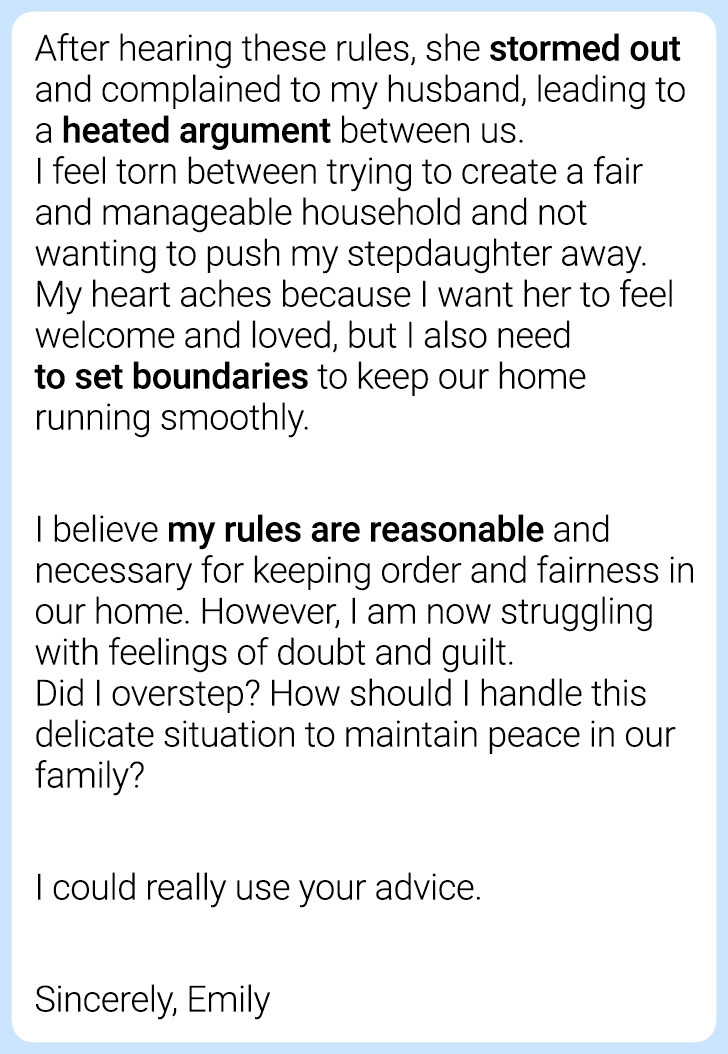Children of divorce catch on at a very early on how to manipulate and pit their parents against each other. 6
I Refuse to Let My Husband’s Daughter Live With Us Unless She Follows My Rules

Emily never wanted to live in the same house with her husband’s teenage daughter. However, when the daughter asked to move in, Emily felt she couldn’t simply say no. She agreed but made it clear that her stepdaughter would need to respect her rules. Emily didn’t expect her request to lead to family drama and conflict, so she turned to Bright Side seeking advice.


Your children can live there but his child can't is what your saying. Hope your husband isn't surprised and knows who's to blame when she goes no contact.
My house, my rules, PERIOD!

You are correct but should just say you don't want her there. Asking her to get rid of the dog says that anyway.

I don’t hear anyone asking why this child is not speaking to her own mother. Her mother is obviously NOT DEAD! She is choosing NOT to live at her home, with the parent who obviously has parental custody of her. Sounds like a spoiled brat who wants to move somewhere where she thinks she can live free and act like an adult! I have lots of friends who had to leave their pets at home or rehouse them because they were not allowed where they moved or they just couldn’t afford the pet fees. And how unfair is it to a pet to have to live somewhere with someone who is allergic to you and they resent your being in their home?!
Thank you, Emily, for trusting us with your story. The situation is indeed difficult, especially with a teenager adjusting to a new family dynamic. We hope that our advice will be helpful for you.
Communicate clearly.
Sit down with your stepdaughter and have an open, honest conversation about the rules and why they are important. Explain that these rules are not meant to be punitive, but to ensure fairness and maintain order in the household. Listen to her concerns and be open to discussing possible adjustments that could make her feel more comfortable without compromising your family’s needs.
Seek common ground.
Find areas where you and your stepdaughter can agree. For example, you could be flexible with the rules, like letting her ease into the chores over time or finding a solution for her dog if bringing it isn’t possible. Compromising can reduce tension and show that you’re willing to work together to make things work.
Consider involving a counselor.
Consider bringing in a family counselor or mediator if talking things through remains difficult. A neutral person can help guide a productive discussion between you, your husband, and your stepdaughter, making sure everyone’s concerns are listened to and handled fairly.
Create a plan.
Recognize that moving in can be a significant adjustment for a teenager. Develop a transition plan that includes gradual integration into the household rules and responsibilities. This approach can help her adapt more smoothly and feel more included in the family dynamics.
Reaffirm your support.

The biggest mistake she made was not talking this over with her husband beforehand and coming to a mutually agreed upon set of rules and then having h be the one to present those rules to his daughter.
Making up the rules on her own and going to the daughter on her own to tell her the rules she decided upon was a mistake.
Doing things the way she did was bound to create resentment from the daughter since she is her stepmother and not her actual mother (step parents disciplining or making rules for their step children rarely goes well); as well as from her husband for not including him in the decision making process for the rules for his child.
While her rules may have been reasonable, she pretty much went about it in the worst way possible.
Make sure your stepdaughter knows that, despite the rules, you care about her and want her to feel welcomed and valued in the family. Spend quality time with her and show support in ways that help build trust and strengthen your relationship. This will help her feel loved and reduce feelings of resentment or rejection.
Relationships with in-laws can also be difficult, especially when you have different views on important subjects. When a caring grandmother discovered that her daughter-in-law was only bathing the children twice a week, she couldn’t help but step in. Little did she expect that her actions would lead to family conflict and drama.
Comments
But the key word to me was 'ideal'that in the sentence made it sound like she really doesn't want her living with them at any rate. Most likely making it more difficult for the teen ok first it's these 4 rules, what's going to happen next to try to get her to leave and then after that if the second motive doesn't work. I feel. Like the step mom is beating around the bush to hide majority of the extension she's going to bring making herself sound good but just another Disney evil step mother.
I'm a mother of 5 adult children and they all have to follow the same rules. Boundaries are very important for children. Remember your step daughter will be an adult one day.
Nothing abnormal or out of line with these rules. Seems like normal expectations to me. Maybe the same kinds of rules are why she doesn't want to live with her mother.
Whose home is it? If the wife's home she should make the rules and the husband's daughter should understand. If the home belongs to the husband, then the wife needs to set up the rules with her husband and he can lay them out to his daughter.
How would you feel if your step daughter was with her dad full time when you and him got married and your kids lived with their dad then wanted to move in with you guys and your husband set boundaries and rules on them? You would be mad and say that's unfair to them.
Related Reads
My Husband Cruelly Abandoned Me During Childbirth, and Here’s How I Got Even

My Mom Lied to Family for Years About Me, but She Met Her Karma at a Family Reunion

Bright Siders Share 18 Creepy Stories That Will Give You the Heebie-Jeebies

Helen Hunt, 60, Stuns During Her Latest Appearance, and Her Lips Become the Center of Attention

15 Celebs Who Have Changed So Much Over Time, It Seems They’ve Lived More Than One Life

10+ People Shared the Creepiest Glitch They’ve Experienced

I Fell in Love With a Man I Didn’t Know Was Married, Now I Want to Ruin His Family

15 Success Moments From Strangers That Deserve All the Golden Buzzers in the World

10 Powerful Stories That Show Kindness Always Finds Its Way Back

15 Moments That Show Kindness Is Quiet but Changes Everything

15 Moments That Prove Quiet Kindness Doesn’t Break, Even When We Do

11 People Who Chose Humanity Over Hatred in the Darkest Moments


